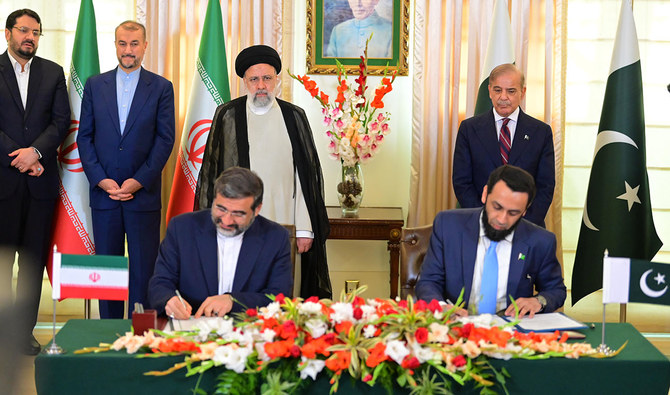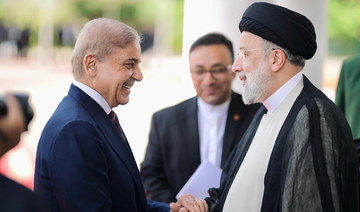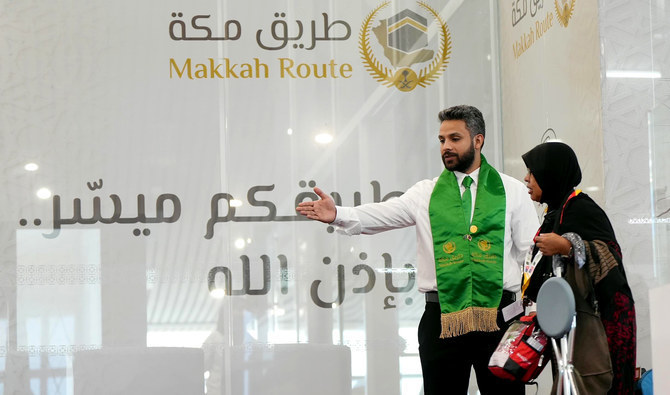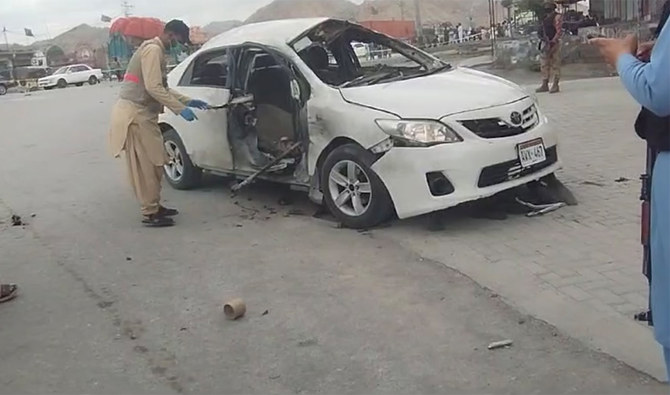ISLAMABAD: Iranian President Ebrahim Raisi said on Monday Islamabad and Tehran had committed to strengthening bilateral relations across political, economic, trade, and cultural domains through the signing of eight accords and memorandums of agreement.
Raisi arrived in Islamabad on Monday on a three-day visit as the two Muslim neighbors seek to mend ties after unprecedented tit-for-tat military strikes this year. He is accompanied by his spouse and a high-level delegation of cabinet members and businesspersons.
The Iranian president was presented with a guard of honor by a Pakistan army contingent upon his arrival at the Prime Minister’s House. He subsequently held meetings with Foreign Minister Ishaq Dar and Prime Minister Shehbaz Sharif.
The MoUs and agreements cover different fields including trade, science technology, agriculture, health, culture, and judicial matters. They include an MoU on the establishment of the Rimdan-Gabd Joint Free/Special Zone; on cooperation between the Ministry of Cooperative Labour and Social Welfare of Iran and the Ministry of Overseas Pakistani and Human Resources Development of Pakistan; on judicial assistance and legal cooperation at the ministry levels; on cooperation for animal hygiene and health; on mutual recognition in the field of quarantine and phytosanitary; and on the promotion of culture and films.
The signing ceremony also marked the ratification of a security cooperation agreement between the governments of two countries.
“Today in our meeting with [Pakistani] prime minister, and other members of the respective cabinet, we decided to promote the bilateral relations between the two countries at political, economic, trade, culture, including others, at all levels as far as possible,” Raisi said at a joint press stakeout with Pakistani premier Sharif.
The Iranian President said both countries were committed to combating terrorism, organized crime, narcotics, and various forms of insecurity that threatened not only the neighbors but the wider region.
“There are a number of common positions and stance between our two countries when it comes, for instance, to fighting against terrorism,” he said, adding that Iran and Pakistan shared a lengthy common border, which presented an opportunity to create and bring about welfare for the people residing in border areas and regions.
“The economic and trade volume between Iran and Pakistan is not acceptable at all and we have decided at the first step to increase the trade volume between our two countries to $10 billion,” Raisi added.
Speaking at the press conference, Sharif said both countries collectively needed to work to strengthen bilateral relations, transforming their shared border into a “beacon of development and prosperity.”
“Today presents an opportunity to forge our friendship into a catalyst for progress and prosperity and the decisions made today regarding economic progress and connectivity will yield visible results,” the PM said.
He also commended the “resolute stance” taken by the Iranian nation against Israeli actions in Gaza, where 35,000 people have been killed in Israeli air and ground offensives since Oct. 7. Sharif called on Iran and Pakistan to unite at the OIC and other international forums alongside fellow Islamic nations to push for a complete ceasefire.
Later, the Iranian president met with his Pakistani counterpart, Asif Ali Zardari, at the Presidency in Islamabad, where the two leaders expressed deep commitment to the longstanding Pakistan-Iran relations.
“They emphasized the need for further deepening and broadening of bilateral relations in diverse fields and for enhancing high-level dialogue and mutually beneficial cooperation,” the Pakistan presidency said in a statement.
In a meeting with Pakistan Army Chief General Asim Munir, both sides concurred on the necessity to bolster bilateral cooperation while jointly striving for regional stability and economic prosperity, according to the Pakistani military. The discussions primarily focused on matters of mutual interest, notably regional peace, stability, and border security.
“COAS (chief of army staff) described the Pak-Iran border as ‘the border of peace and friendship,’ emphasizing the need for improved coordination along the border to prevent terrorists from jeopardizing the longstanding brotherly relations between the two neighboring countries,” the Inter-Services Public Relations (ISPR), the military’s media wing, said in a statement.
“President Ebrahim Raisi emphasized that by fostering cooperation between the two Armed Forces, Pakistan and Iran can attain peace and stability for both nations and the region.”
Raisi also met Yusuf Raza Gillani, chairman of the Senate of Pakistan, and National Assembly Speaker Ayaz Sadiq.
“OFTEN AT ODDS”
During his visit from April 22-24, the Iranian head of state is also scheduled to meet the Pakistani president, Senate chairman and National Assembly speaker. He will also visit the cities of Karachi and Lahore to meet the country’s provincial leadership.
Raisi’s visit is the first by any head of state to Pakistan after the South Asian nation’s contentious elections of February 2024 and the formation of a new government headed by Sharif. The visit also comes as tensions are high in the Middle East after Iran launched airstrikes on Israel a week ago and Israel retaliated with its own attack on Friday.
Pakistan and Iran have had a history of rocky relations despite a number of commercial pacts, with Islamabad being historically closer to Saudi Arabia and the United States.
Their highest profile agreement is a stalled gas supply deal signed in 2010 to build a pipeline from Iran’s South Fars gas field to Pakistan’s southern provinces of Balochistan and Sindh.
Pakistan and Iran are also often at odds over instability on their shared porous border, with both countries routinely trading blame for not rooting out militancy.
Tensions surged in January when Pakistan and Iran exchanged airstrikes, both claiming to target alleged militant hideouts in each other’s countries. Both sides have since then undertaken peace overtures and restored bilateral ties.
Former diplomat Naghmana Hashmi said the Iranian President’s visit with a large delegation indicated that both countries had put aside “all sources of irritation,” particularly the recent border skirmishes.
“He is also visiting the commercial centers like Lahore and Karachi, which absolutely is a very clear signal that we want to take the economic relationship that the two countries have, to greater heights, and to increase the flow of trade, to encourage the barter trade and the border markets that we have recently established,” she told Arab News.
Hashmi added that both countries were important forces for peace and security in the region.
“At the time when Iran’s tension with the Israel is at its peak, for the president of Iran to come to Pakistan shows his confidence, both as a leader and as a nation, on us being a good neighbor and they consider Pakistan as their great friend,” she added.
Former Pakistani ambassador to Iran, Riffat Masood, said Raisi’s visit was important in the backdrop of recent hostilities between Israel and Iran.
“And, of course, when the leadership of the two countries meet, they will definitely discuss the way forward in trying to bring an end to or at least reduce the hostilities,” she told Arab News.
She said Raisi’s visit would also further enhance security and economic cooperation between Pakistan and Iran.
“The recent border issues are not expected to have a significant impact,” Masood said, “as both countries swiftly addressed them before any negative consequences could affect bilateral relations.”


















